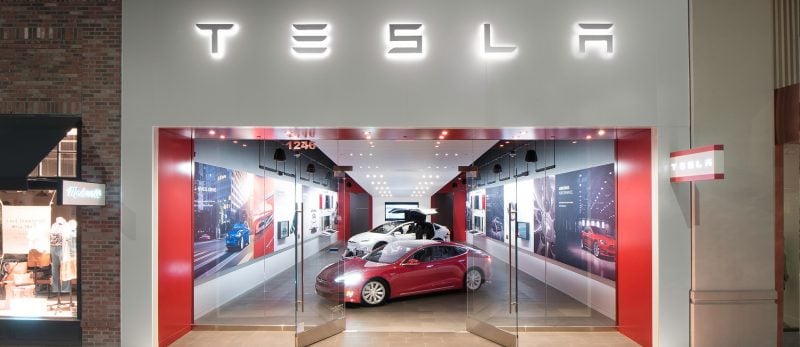
When you look at truly disruptive companies on the market, Tesla is by far one of the best examples. Not only has Tesla completely changed the way we look at electric vehicles, they’ve also changed the car buying experience for the better.
If you’ve ever been to a Tesla Store, you’ll notice that they’re Tesla Stores are not called Tesla Dealerships. They’re usually conveniently located in malls or shopping areas rather in secluded areas of the city where every other car dealership is located. You’ll also notice that Tesla doesn’t really have a lot of cars in a lot for you to pick and choose from. And best of all, they don’t have the stereotypically pushy car salespeople with the 4-square sales box playing mind games with you trying to extract every dollar out of you while you fight for every dollar you’ve got. If you’ve been to a car dealership, you know what I mean.
Before we understand how truly disruptive Tesla’s Store model is, we must first understand how the car dealership model works and why it came about.
In the early days, cars were actually sold a bit like how Tesla does it today. automakers would sell cars directly to customers via mail order, in malls, and via various other means. As social media and other mass communication platforms did not exist yet, this meant that automakers were limited in growth as it was cost prohibitive to build out stores and build cars at the same time. As a result, the dealership model was invented allowing car makers to quickly scale up a distribution and service network without any money out of pocket. Dealership owners made money and car makers made money. It was a win-win situation. This is the car dealership model we have today.
However, the dealership model did have a serious flaw. Different dealerships worked differently from each other. As a result, the buying experience from one dealership to another would be wildly different and each dealership was essentially competing against other dealerships to make money so many would do whatever it took to get the sale. As dealerships don’t actually make a product, their profits are driven by marking up cars and service, so in many studies car dealerships add about 10-15% additional cost to either the customer or the automaker.
Dealerships also have conflicting interests when it comes to vehicle sales. As dealerships generally make as much as 50% of their revenue on service, they have more of an incentive to sell internal combustion engine (ICE) cars rather than electric vehicles (EV) as EVs don’t require much of the maintenance needed by an ICE car.
With that in mind, you might be asking why do we even have car dealerships anymore? Well, the reason for that is essentially dealership associations are an incredibly powerful political lobby and were able to get auto franchise laws put in place to prevent their obsolescence. Auto franchise laws often include mandatory dealership licensing (must have dealerships), pro dealership terms for terminating dealerships, and the creation of territories for incumbent dealers. In 1979, less than half of US states had these types of laws whereas by 2014, Maryland was the only state without all three of the laws.
Since its inception, Tesla does not do the franchise model. Rather, Tesla has company owned stores, galleries, and service centers. As they don’t have a single franchised dealer in the entire country, they are able to circumvent the auto franchise laws in most states by selling cars directly to customers online.
Tesla Stores are a bit of a misnomer as they don’t actually sell vehicles. Instead, they provide customers a low pressure way of learning about Tesla vehicles while out at a mall or shopping center. Unlike a traditional car, there’s quite a bit more education required for a Tesla vehicle due to its advanced technology, so having company owned stores allow customers to receive consistent service across the country. If customers want to buy a vehicle, they go to the Tesla website on their smartphones or utilize the store’s tablet to make an online order. Unfortunately, it’s not possible to buy a vehicle “on the lot” of a Tesla store as this would be illegal, thanks to draconian dealership laws.
Speaking of draconian dealership laws, Tesla is still banned from selling vehicles in 10 US states and can only operate on a limited basis in 9 US states. As a US company making cars in the US, it’s crazy to see that they are unwelcome in so many states due to these laws.
Tesla’s demonstrated success with company owned stores has redefined the car buying experience, and it’s also a significant competitive advantage for the company. Without dealerships taking a portion of profit, Tesla is able to sell and maintain their vehicles at a lower cost to the customer and to Tesla as compared to a legacy automaker.
It’s clear that dealerships have seen their gradual obsolescence for the past few decades which is likely why the auto dealer lobby has done so much to put in place all the auto franchise laws across the US. However, with the introduction of Tesla and the upcoming proliferation of electric vehicles, it may spell the end of the dealership model as a whole.
This post was last modified on February 15, 2020 11:48 am
Whether you're a CrossFit enthusiast, a rucking adventurer, a high-intensity interval training (HIIT) devotee, or…
Introduction Credit scores are a crucial part of our financial lives, yet many people don't…
Earlier this week, T-Mobile and SpaceX jointly shared that they would be making an announcement…
Starlink Satellite Dish | Source: SpaceX In a recent Tweet sent out by SpaceX, wireless…
With the release of Tesla FSD (Full Self Driving) 10.69 Beta starting to roll out…
Tesla Powerwall Last year, Tesla launched a pilot of their VPP (Virtual Power Plant) where…
This website uses cookies.